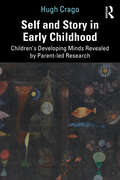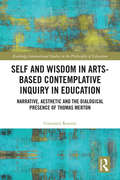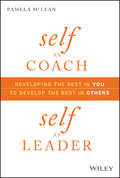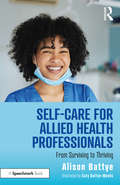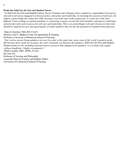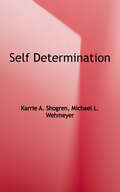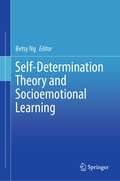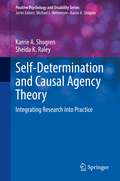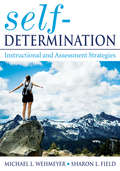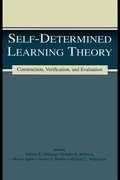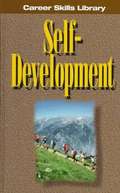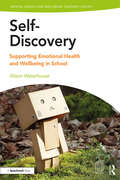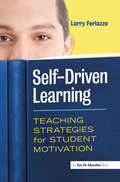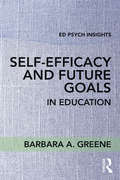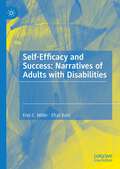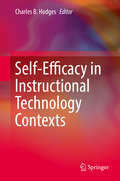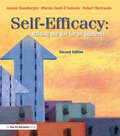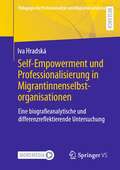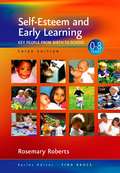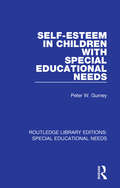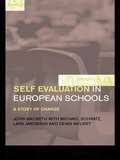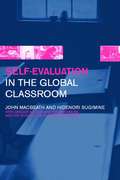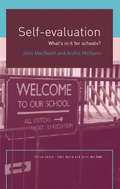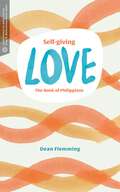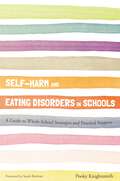- Table View
- List View
Self and Story in Early Childhood: Children’s Developing Minds Revealed by Parent-led Research
by Hugh CragoOur children grow up into a world of stories—in books, on screens—but what do they make of the stories we offer them? What do they think and feel as they listen to a parent read a picture-book? What if a story confuses or upsets them? Over the past fifty years, several intelligent, committed mothers undertook the onerous task of recording exactly what their children said and did in response to the stories they shared. Some of their records extended over five years, or even longer. Their research, done without funding or academic supervision, offers us unparalleled insight into children’s minds long before they learn to speak—let alone learn to read. In Self and Story in Early Childhood, Hugh Crago draws on his unusual combination of expertise in literary studies, developmental psychology and psychotherapy to re-examine the startling implications of this neglected body of evidence. He highlights how much children can achieve without formal teaching, but with the supportive presence of a trusted adult who will participate with them in the story experience. This book will be of great interest to scholars of developmental psychology, early literacy and narratology, as well as to professionals working with preschoolers. Most of all, it will fascinate parents who themselves share stories with their child.
Self and Wisdom in Arts-Based Contemplative Inquiry in Education: Narrative, Aesthetic and the Dialogical Presence of Thomas Merton (Routledge International Studies in the Philosophy of Education)
by Giovanni RossiniBy foregrounding a first-person perspective, this text enacts and explores self-reflection as a mode of inquiry in educational research and highlights the centrality of the individual researcher in the construction of knowledge. Engaging in particular with the work of Thomas Merton through a dialogical approach to his writings, Self and Wisdom in Arts-Based Contemplative Inquiry in Education offers rich examples of personal engagement with text and art to illustrate the pervasive influence of the personal in reflective, narrative, and aesthetic forms of inquiry. Chapters consider methodological and philosophical implications of self-study and contemplative research in educational contexts, and show how dialogic approaches can enrich empirical forms of inquiry, and inform pedagogical practice. In its embrace of a contemplative voice within an academic treatise, the text offers a rich example of arts-based contemplative inquiry. This unique text will be of interest to postgraduate scholars, researchers, and academics working in the fields of educational philosophy, arts-based and qualitative research methodologies and Merton studies.
Self as Coach, Self as Leader: Developing the Best in You to Develop the Best in Others
by Pamela McLeanBecome a more effective leader by discovering the resources you already have Pamela McLean, CEO and cofounder of the Hudson Institute for Coaching, has been at the forefront of the field for the past three decades, using clinical and organizational psychology to provide the highest-quality coaching and development training to professionals in organizations and solo practice worldwide. Now, Pamela is teaching readers to cultivate their leadership potential through “use of self as instrument,” a key dimension of developmental coaching that emphasizes the whole person. Her holistic methods give coaches and other leaders a clearer framework for getting to know themselves, exploring their multiple layers, and fostering their latent abilities so that they can foster the abilities of others. Self as Coach guides you along a path that interweaves six broad dimensions of your internal landscape into the fabric of great coaching. This creates lasting improvements, unlike more common remedial, tactical, or performance-based programs, which often only function as short-term solutions. Develop leadership skills using internal resources you already possess Achieve real improvements with long-lasting benefits Based on methodology proven successful in business and personal settings Includes useful practices and exercises for self-reflection and brainstorming Whether you’re an emerging or experienced coach, whether you want to grow your own leadership skills or develop them across an entire organization, Self as Coach can help. With its innovative approach, proven methods, and near-universal applicability, this book will not only provide effective instruction but also help you uncover lasting insights that will benefit you long after you’ve turned the last page.
Self-Care for Allied Health Professionals: From Surviving to Thriving
by Alison BattyeSelf-Care for Allied Health Professionals brings together a collection of self-care strategies into one easy-to-read volume, supporting Allied Health Professionals to do the best for their patients by caring for themselves. The book offers information and practical strategies to look after your physical and emotional wellbeing at home and in the workplace, exploring topics such as sleep and food, resilience and meditation, stress, conflict and adversity. Written to be a flexible tool that can be read cover to cover or dipped in and out of as needed, it offers rapid response self-care strategies alongside more lasting changes, supporting practitioners to make small steps to build healthy habits for the future. Key features of this book include: –– A combination of quick response strategies, like a five-minute breathing exercise you can use before a difficult meeting, and opportunities for deeper work, examining your purpose and aligning your role with your values. –– Combines ancient practices of meditation and mindfulness with the latest research on nutrition, exercise, sleep and wellbeing. –– Consideration of the challenges professionals face in the context of pandemics and a changing health and social care landscape, helping you to thrive in a challenging world. Self-care has never been more important. This is a book that every Allied Health Professional and trainee should have on their desk, to improve productivity, enhance job satisfaction and build resilience for whatever the future brings.
Self-Care for New and Student Nurses
by Dorrie Fontaine Tim Cunningham Natalie MayWhile you have chosen one of the most noble professions, you have also chosen one of the most difficult. In your career, you will face challenges big and small, whether it is a problematic coworker, the death of a favorite patient, or a global pandemic. You will have bad days or weeks when you ask yourself why you didn't choose a less demanding path in life. You will experience exhaustion, frustration, and grief. You will balance not only your nursing responsibilities, but also your commitments to your family and community. But as you question your life choices and wonder how you can take one more step forward, that voice inside you will whisper, "You are a nurse." <p><p>Our goal in writing this book is that you never have to betray that voice. No matter what comes your way, you will have the strength, skills, and resilience to keep moving forward. But let us be clear: we do not want you to move forward at the expense of yourself or your well-being. We want you to move forward with wisdom and clarity of purpose by using every resource you can muster. We hope that what is contained in this book will become a valuable resource throughout the early years of your career, and even beyond. <p><p>We welcome you on this journey, and we hope you welcome the opportunity to explore the concept of self-care, what it means, what works best for you, and how it can help you flourish in good times and help you grow in difficult ones.
Self-Determination
by Michael L. Wehmeyer Karrie Ann ShogrenThis book offers specific and clearly described strategies for teaching learners with ASD to become more self-determined in their actions regarding their educational program plans and outcomes.
Self-Determination Theory and Socioemotional Learning
by Betsy NgThis book approaches the field of socioemotional learning from the perspective of self-determination theory (SDT). The volume examines socioemotional learning (SEL) in schools, higher educational institutions, and workplaces. It is a timely work in its comprehensive presentation of a means of understanding motivation for one’s own work, the motivation of others, stress tolerance, team-working, conflict resolution, as well as dealing with critical situations. Socioemotional learning relates to competencies in a combination of behaviors, cognitions, and emotions that are essential for all individuals’ success, including educational and employment settings. This book presents the most comprehensive discussion of SDT perspectives on socioemotional learning in various domains, ranging from formal to informal settings. This book is an essential resource for social scientists, educators, and researchers working in education, organizational psychology, and family sociology.
Self-Determination and Causal Agency Theory: Integrating Research into Practice (Positive Psychology and Disability Series)
by Karrie A. Shogren Sheida K. RaleyThis book introduces Casual Agency Theory as a framework for defining self-determination and describing its development and essential characteristics. It synthesizes the research on promoting and enhancing self-determination and explores implications for practice in a disability context across the life course. The book also highlights future directions for theory, research, and practice in areas of positive psychology and disability. Key areas of coverage include: Theoretical basis of the development of self-determination as well as research findings and implications for practice across the life course. Issues relating to the implementation of evidence-based practices to promote self-determination in a disability context. Potential strategies for overcoming barriers to self-determination through research-based practices. Future directions for further integrating Casual Agency Theory into positive psychology interventions and the systems of supports in the disability field. Self-Determination and Causal Agency Theory is an essential resource for researchers, professors, and graduate students as well as clinicians, therapists, and other professionals in the fields of developmental and positive psychology, educational policy and practice, special education, social work, occupational, speech, and language therapy, public health, and healthcare policy.
Self-Determination: Instructional and Assessment Strategies
by Michael L. Wehmeyer Sharon FieldThis teacher-friendly guide presents research-proven instructional techniques that empower students with disabilities to become their own advocates and use effective choice-making, problem-solving, and goal-setting skills.
Self-Determined Learning Theory: Construction, Verification, and Evaluation
by Michael L. Wehmeyer Dennis E. Mithaug Deirdre K. Mithaug Martin AgranThe authors present a theory that in the field of special education, the process of learning is adjustment, explains why freedom of choice enhances learning.
Self-Development Skills
by Dandi Daley MackallThe Career Skills Library describes the skills, traits, and attributes that are crucial to success in any field. This series details the competencies identified by the Department of Labor's SCANS (Secretary's Commission on Achieving Necessary Skills) as essential to solid job performance. Each book focuses on one of these skills in the workplace and shows how students can improve that skill while still in school. Self-Development -- Examine traits like dependability, integrity, and honesty that will help you succeed in all areas of your life.
Self-Discovery: Supporting Emotional Health and Wellbeing in School (Mental Health and Wellbeing Teacher Toolkit)
by Alison WaterhouseOne of the five books in the Mental Health and Wellbeing Teacher Toolkit, this practical resource focuses on how to support children and young people on a voyage of self-discovery, as they learn to be their own best friend. The book offers research-driven, practical strategies, along with creative material and step-by-step lesson plans to support educators and health professionals. This is a resource book for practitioners looking to have a positive impact on the mental health and wellbeing of the children and young people in their care; both now and in the future. Chapters span key topics including Developing Resilience, Positive Thinking, Emotional Awareness and Self-Efficacy. A complete toolkit for teachers and counsellors, this book offers: Easy to follow and flexible lesson plans that can be adapted and personalised for use in lessons or smaller groups or 1:1 work Resources that are linked to the PSHE and Wellbeing curriculum for KS1, KS2 and KS3 New research, ‘Circles for Learning’, where the introduction of baby observation into the classroom by a teacher is used to understand and develop self-awareness, skills for learning, relationships, neuroscience and awareness of others Sections on the development of key skills in communication, skills for learning, collaboration, empathy and self-confidence Learning links, learning objectives and reflection questions. Offering research-driven, practical strategies and lesson plans, Self Discovery is an essential resource book for educators and health professionals looking for fresh, engaging ways to support the wellbeing of children and young people.
Self-Driven Learning: Teaching Strategies for Student Motivation
by Larry FerlazzoIn this lively, research-based book, award-winning educator Larry Ferlazzo tackles everyday classroom challenges with creative instructional techniques to help middle- and high-school teachers develop self-motivated and high-achieving students. The practical tips, online resources, and mini-lessons in this book encourage students to take charge of their own learning, boosting their success in and outside of the classroom. Detailed lesson plans in every chapter align with the Common Core English Language Arts Standards and cover a variety of valuable skills, including: Personal responsibility and perseverance Social and emotional learning Standardized test-taking strategies And much more!
Self-Efficacy and Future Goals in Education (Ed Psych Insights)
by Barbara A. GreeneAs the inner resource that drives us to pursue activities, to put forth effort, and to avoid failure, motivation is key to overall well-being. Self-efficacy and future goals are important to understanding and reinforcing the motivation to learn, especially for students in classroom settings. Written by a leading expert on motivation, this book situates the topic within the broader context of educational psychology research and theory, and brings it to a wider audience. With chapters on the fundamentals of self-efficacy and future goals, their importance for student learning, and how to develop them in educational settings, this concise volume is designed for any education course that includes student motivation in the curriculum. It will be indispensible for student researchers and both pre- and in-service teachers alike.
Self-Efficacy and Success: Narratives of Adults with Disabilities
by Erez C. Miller Efrat KassBased on the analysis of eighteen authentic and inspiring personal stories, this book illustrates how people with severe childhood disabilities achieved extraordinary career success. Growing up, the people surrounding them and environmental conditions helped them develop their self-efficacy. The book is divided into four parts. It begins by discussing the elusive essence of success, especially for people with disabilities. The authors then discuss selfefficacy, and how it pertains to occupations of people with disabilities. Part two (school years) and part three (higher education) address some of the challenges experienced by students with disabilities. It shows how parents and educational figures helped them enhance their self-efficacy. Part two also discusses current and future trends in inclusive education, and recommendations for practitioners. Part three pays attention to some of the unique traits that helped them overcome obstacles. Finally, the authors focus on employment of people with disabilities and explore some of the consequences of the Covid-19 pandemic in light of this. It includes messages of hope to parents, professionals and individuals with disabilities.
Self-Efficacy in Instructional Technology Contexts
by Charles B. HodgesThis edited volume contains reports of current research, and literature reviews of research, involving self-efficacy in various instructional technology contexts. The chapters represent international perspectives across the broad areas of K- 12 education, higher education, teacher self-efficacy, and learner self-efficacy to capture a diverse cross section of research on these topics. The book includes reviews of existing literature and reports of new research, thus creating a comprehensive resource for researchers and designers interested in this general topic. The book is especially relevant to students and researchers in educational technology, instructional technology, instructional design, learning sciences, and educational psychology.
Self-Efficacy: Raising the Bar for All Students
by Robert Bertrando Marcia Conti- D' Antonio Joanne EisenbergerThe fourth edition of this highly praised book includes coverage of evidence-based education and No Child Left Behind. Like the previous editions, it offers authoritative and balanced overviews to help you make distinctions between innovative programs backed up by sound research support and “faddish” ideas which lack a research base.
Self-Empowerment und Professionalisierung in Migrantinnenselbstorganisationen: Eine biografieanalytische und differenzreflektierende Untersuchung (Pädagogische Professionalität und Migrationsdiskurse)
by Iva HradskáDas Forschungsinteresse dieser Studie richtet sich auf das Zusammenspiel von Biografie und Professionalisierungsprozessen von Akteurinnen in Migrantinnenselbstorganisationen (MSO) bei der Ausübung ihrer Bildungs- und Beratungsarbeit. Es werden drei Fallanalysen mit markanten Innenansichten präsentiert. Als Ergebnis werden drei Muster vorgestellt, die auf unterschiedliche Herstellungsprozesse biografischer Passungsverhältnisse individueller undorganisationaler Professionalisierung und Self-Empowermentstrategien der Akteurinnen verweisen. Die Muster zeigen, dass die Akteurinnen eine bestehende dynamische Wechselbeziehung zwischen der ausgeübten Tätigkeit und den Interaktionsressourcen aus ihren Migrationsbiografien zu nutzen und individuelle Lösungs- und Bewältigungsstrategien bei der Professionalisierung und Etablierung der MSO anzuwenden vermögen. Die priorisierten Zielverständnisse ihrer Tätigkeit unterscheiden sich entlang der drei ausgearbeiteten Muster: die Möglichkeiten die gesellschaftliche Partizipation von Migrantinnen zu erhöhen, Selbstverwirklichung der Migrantinnen zu unterstützen und migrations- und geschlechtsbezogene Exklusionsprozesse zu minimieren.
Self-Esteem and Early Learning: Key People from Birth to School (Zero to Eight)
by Dr Rosemary RobertsFocusing on the period from birth to school, this book is about babies' and young children's feelings, their learning; and the ways in which the adults in their lives can support their emotional, social and cognitive development. Looking at the perspectives both of the child and the adult, it presents thought-provoking ideas and questions on how adults can make the most of opportunities to support the children with whom they live and work. A story, in episodes embedded throughout the book, makes this an accessible and enjoyable read. In this third edition, there are new and updated chapters on: * Young children's transitions, with a particular focus on starting school * Young children's positive 'learning dispositions' * Brain research and its possible implications * Further reading, signposting some enchanting children's books as well as important new texts. The book explores the basis of the 'key person' relationship, looking at attachment 'in practice', and linking developmental issues with the early development of self esteem. Written for students on early childhood courses and staff in early childhood care and education settings and integrated Children's Centres, the book will also be of interest to parents and carers.
Self-Esteem in Children with Special Educational Needs (Routledge Library Editions: Special Educational Needs #28)
by Peter W. GurneyFirst published in 1988. The mounting concern in schools over widespread failure in academic achievement, greater disaffection in children and the lack of confidence in many school leavers are highlighted by the difficulties experienced by children who have special educational needs. Within this group the importance of the child’s evaluation of him or herself – i.e. self-esteem – is a neglected issue. This book investigates how the level of self-esteem appears to influence social behaviour and school performance in children with special educational needs. It discusses the practical steps that can be taken to assess and enhance self-esteem in children with special needs and evaluates their effectiveness. The author emphasises the discrepancy between the performance of children who have special educational needs in ordinary classrooms with that achieved in special settings. He argues that the negative impact on a child’s self-esteem created by placing him/her in an ordinary classroom may outweigh the benefits of greater integration. A full and informative treatment of both the theoretical and practical implications of a neglected subject, this text book is suitable for experienced special educational needs teachers and those undergoing teacher training, as well as psychologists with an academic interest in the self-concept or a professional involvement in assessing children.
Self-Evaluation in European Schools: A Story of Change
by Michael Schratz John MacBeath Lars Jakobsen Denis MeuretIn a political and economic climate in which school performance is made public, performance tables and inspectors' reports can only tell a partial story.This is a unique book. It tells the story of one school seen through the eyes of a pupil, a parent, a teacher, a headteacher and a critical friend. The story is a compelling journey through the process of school improvement; theories of school effectiveness and school improvement are progressively clarified.This book is based on a well-known and well-documented research project that represents eighteen European countries, which clearly sets it in a European Policy context. It includes a wealth of practical tools for raising standards for teachers and school managers to refer to, and guidance on how to use them.This eagerly awaited follow-up to Schools Must Speak for Themselves by John MacBeath (RoutledgeFalmer 1999) is a vital and useful source of good ideas, challenging insights and practical strategies for real schools.
Self-Evaluation in the Global Classroom (What's In It For Schools? Ser.)
by John MacBeath Hidenori SugimineSelf-evaluation is going global. This book describes what happened when teams of school students from across the world embarked on the trip of a lifetime to explore the school lives of their international contemporaries.The students involved in The Learning School project used a variety of tools to evaluate the learning, motivation and self-evaluation abilities of school students in the UK, Sweden, Japan, Germany, the Czech Republic, South Africa and South Korea. From the easy freedom of the Swedish school to the highly structured day in the Czech Republic, this study shows that success and effectiveness in education really is in the eye of the beholder.The results of this study have significant implications for school leaders and managers, policy makers and academics, and all those concerned with school improvement. This lively and accessible book makes intriguing and important reading, raising fundamental questions about how we judge quality and effectiveness in teaching and learning.
Self-Evaluation: What's In It For Schools? (What's in it for schools?)
by John MacBeath Archie McglynnSelf-evaluation in schools sits at the top of the national agenda in response to an awareness that performance tables and inspector's reports can only tell a partial story. Schools are now encouraged to raise questions about 'How are we doing?' and 'How do we know?'. Self-Evaluation: What's in it for Schools? demystifies school self-evaluation and encourages schools to be self-critical and self-confident. The book helps schools and teachers develop the necessary confidence to work with evaluation tools. Accessible and packed with case studies, it tackles the issues that are at the forefront of the national agenda in most countries in Europe. Challenging ideas for the future are given through discussion of the concerns and issues of schools in the present day.
Self-Giving Love: The Book of Philippians (Transformative Word)
by Dean Flemming"Have this mind among yourselves..." Everyone needs examples. We all need mentors we admire and after whom we can pattern our lives. Without them, we will not mature. Philippians is a letter full of good examples. Paul, Epaphroditus, and Timothy are all portrayed as exemplars. But none is more important than Jesus himself. In Self-Giving Love, Dean Flemming shows how Jesus and the story of his self-emptying love are the very heart of Philippians. This ultimate example provides a lens for clearly seeing the rest of the letter. By emulating Jesus' radical love, we will become mature, foster unity, and find joy. Self-Giving Love presents the message and themes of Philippians in a concise and accessible guide, with probing questions for reflection and discussion.
Self-Harm and Eating Disorders in Schools: A Guide to Whole-School Strategies and Practical Support
by Sarah Brennan Pooky KnightsmithSelf-harm and eating disorders are present in almost every school and they frequently co-occur. This book provides the vital guidance that school staff need to spot early warning signs, understand triggers and support the students in their care effectively. This very practical guide helps educational professionals to gain a better understanding of self-harm and eating disorders by dispelling the myths and misconceptions that surround these behaviours. The book provides advice on whole-school policies and procedures as well as day-to-day strategies to implement in lessons, at mealtimes and in one-on-one sessions. It explains how to respond to disclosures, make referrals and work alongside parents to assist in the road to recovery.
